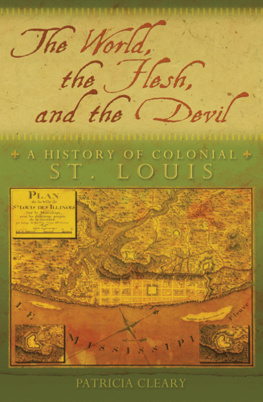
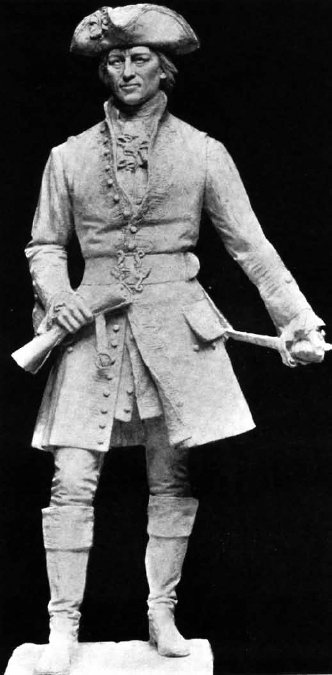
Statue of Laclde by Jonathan Scott Hartley, with facial features of grandson Pierre Chouteau Jr. From Grandeurs of the Universal Exposition at St. Louis (1904).

Published by The History Press
Charleston, SC 29403
www.historypress.net
Copyright 2011 by J. Frederick Fausz
All rights reserved
Cover image: Laclede Landing at Present Site of St. Louis (detail) by Oscar Edward Berninghaus (circa 1914). Courtesy Saint Louis Art Museum. Gift of August A. Busch Jr.
First published 2011
e-book edition 2012
ISBN 978.1.61423.382.4
Library of Congress Cataloging-in-Publication Data
Fausz, J. Frederick.
Founding St. Louis : first city of the new West / J. Frederick Fausz.
p. cm.
Includes bibliographical references.
print edition ISBN 978-1-60949-016-4
1. Saint Louis (Mo.)--History. 2. Saint Louis (Mo.)--History--Pictorial works. 3. Laclde-Liguest, Pierre de, 1724-1778. 4. Chouteau, Auguste, 1750-1829. 5. French Americans--Missouri--Saint Louis--History. 6. Frontier and pioneer life--Missouri--Saint Louis. 7. City planning--Missouri--Saint Louis--History. 8. Osage Indians--Missouri--Saint Louis--History. 9. Saint Louis (Mo.)--Ethnic relations. 10. Saint Louis (Mo.)--Commerce--History. I. Title.
II. Title: Founding Saint Louis.
F474.S257F38 2010
977.866--dc22
2010043552
Notice: The information in this book is true and complete to the best of our knowledge. It is offered without guarantee on the part of the author or The History Press. The author and The History Press disclaim all liability in connection with the use of this book.
All rights reserved. No part of this book may be reproduced or transmitted in any form whatsoever without prior written permission from the publisher except in the case of brief quotations embodied in critical articles and reviews.
To Jeanette and John, who joined me on a journey from the Chesapeake to a West that was new to us and has never grown old.
CONTENTS
ACKNOWLEDGEMENTS
Historians are like voyageurs, traveling upstream and downstream between the then and now along endless rivers of time. As adventurers in the foreign territory of distant ages, they struggle with new currents (of thought), lost cargo (missing records) and treacherous snags (errors that continually resurface) in seeking the portages (thematic links) that connect the past with the present, ensuring that there will be new voyages of discovery in the future. Fortunately, historians rarely travel alone and need many helpful hands to advance their craft (buoyant research).
In 1991, I was a history professor at St. Marys College of Maryland, living in a watery world of crabbers and oystermen only a few miles from where the Potomac River flows into the Chesapeake Bay. My research focused on Indian relations with English colonists along the seventeenth-century Atlantic Coast, and all of my past publications had dealt with that era and area. But my big book on Jamestown was put on hold when I became the first dean of the new Pierre Laclede Honors College at the University of MissouriSt. Louis (UMSL). I had never heard of the man and knew little about the early history of the city.
Being an ignorant but curious outsider was an advantage, since each new discovery was exciting. I immersed myself in the regions fascinating history as a public speaker for the Missouri Humanities Council and the Missouri History Museum. The first books I purchased to support that research were The First Chouteaus: River Barons of Early St. Louis by William E. Foley and C. David Rice and James Neal Primms Lion of the Valley: St. Louis, Missouri, 17641980. I will be forever grateful to Bill and Neal for generously sharing their vast knowledge with me. In 1999, I was fortunate to spend an entire semester as a research fellow at the library and archives of the Missouri History Museum, and I extend my appreciation to President Bob Archibald for that transformative experience. His excellent staff members deserve my thanks, especially Ellen Thomasson, for providing wonderful illustrations in record time; Barnes M. Barney Bradshaw, for hosting my public presentations; and three editors of Gateway Magazine, who nurtured my interest in using illustrations to make history come alive for the general publica commitment shared by The History Press.
I also thank Dr. Bob Moore of the National Park Service at the Gateway Arch for his friendship, wisdom and permission to use his excellent illustration of St. Louis in 1804. He put me in touch with Jennifer R. Clark, archivist at the Jefferson National Expansion Museum, who was most helpful in providing other illustrations. I am grateful to Dr. Kathleen Nigro, whose suberb administration of an NEH (National Endowment of the Humanities) grant during the Lewis and Clark bicentennial funded the thirteen thousand miles I drove to take my Museum on Wheels to many rural communities in four states. Her continued encouragement, along with Jerry Garrett and other friends in the St. Louis chapter of the Lewis and Clark Trail Heritage Foundation, is most appreciated. I also acknowledge the assistance of friends in the Osage Nation; Tim ONeil of the St. Louis Post-Dispatch; Bill Swagerty, a buddy since our travels with the incomparable Francis Fritz Jennings; and Steve Smith of the Royale Food & Spirits, whose intellectual patrons like a dash of history with their cocktails. I am most grateful to my department chairperson, Andrew Hurley, for his sustained support and to colleagues Peter Acsay and Steve Rowan for many stimulating conversations about the history of Missouri.
Particularly helpful in the production of this book were: Dr. Jon Kukla, a dear friend since our Chesapeake days; former UMSL students Sharon Person, Steven Stuckey and Doc Luecke; Darrell Duensing and his staff at the Fort de Chartres State Historic Site; Lesley Barker, director of the Bolduc House Museum in Ste. Genevieve; Susan Newton at Winterthur Museum; Jason Gray, Ella Rothgangel and Cathryn Gowan of the Saint Louis Art Museum; Marshall McClure of MarshallArts in Norfolk, Virginia; and Helen Valle Crist, Emily Horton and Cece Boyer Myers of the Center for French Colonial Studies. I am forever indebted to Ian Stokes of the United Kingdom and Jean Caillabet of New Zealand, who granted permission to use their beautiful photographs of Barn, as well as the Saint Louis Mercantile Library at the University of MissouriSt. Louis for providing access to Auguste Chouteaus original Narrative of the Settlement of St. Louis, which launched my research into the many unansweredand even unaskedquestions about the founding of St. Louis. This book would be very deficient without Shannon Lee Dawdys excellent study of the merchant rogues of New Orleans, Kathleen DuVals keen insights about the Native Ground between the Missouri and Arkansas Rivers and M.J. Morgans path-breaking environmental history of colonial Illinois. Finally, I thank the talented staff of The History Press for their confidence and patience, including Laura All, who provided the contract; publications director Adam Ferrell, who oversaw every aspect of the project with astonishing good humor; and senior editor Jaime Muehl, whose talents in copyediting are exceeded only by her cheerfulness.
Next page
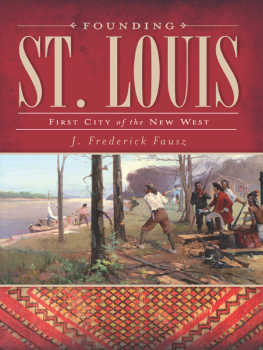
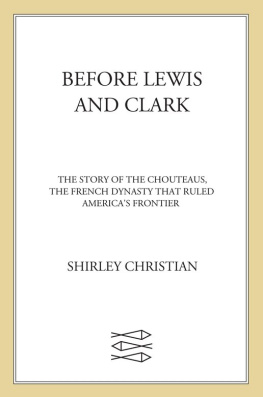

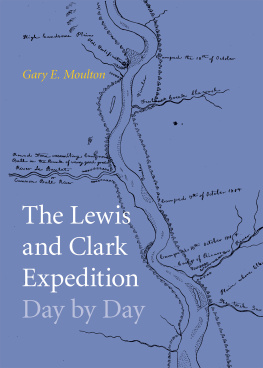
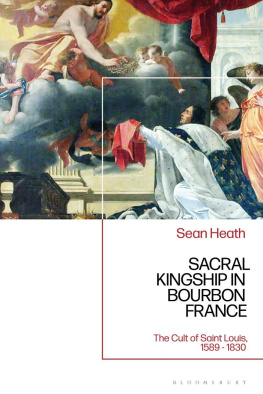
![Louis de Montfort - The Saint Louis de Montfort Collection [7 Books]](/uploads/posts/book/265822/thumbs/louis-de-montfort-the-saint-louis-de-montfort.jpg)
